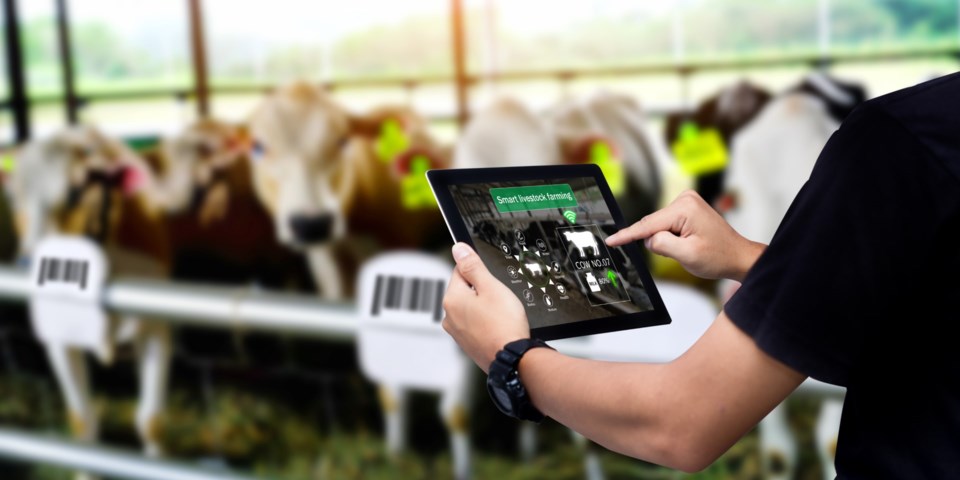WESTERN PRODUCER — “How are we going to keep track of whether (artificial intelligence) is doing its job?”
That humanly intelligent question came from James Hofer, a leader in Manitoba’s hog farming industry and a very smart guy, during the recent Manitoba Swine Seminar.
He was worrying about what happens when the most important person in the barn is replaced by cameras, software and computer analysis.
“The stockperson is the eyes and ears of the barn.”
Here’s how the future should work:
“AI is not going to replace the pigmanship,” responded Matthew Rooda, chief executive officer of SwineTech.
“What it will do is help people more efficiently hyper focus their awareness on problems.”
Hmmmmm, let me think. Don’t labour-saving devices tend to give people more time to watch TV, take part in adult sports leagues, yell at each other on social media and find new ways to spend money?
That’s mostly the experience of North America in the past century and it must apply to farming, too. When you don’t need to do a traditional task any longer, maybe you don’t.
In so many ways this is a good thing. Traditional 1950s women didn’t need to remain slaves to dishwashing and clothes washing once dishwashers and washing machines were widely available and affordable, providing more time for afternoon martinis and despair.
Standard-model men didn’t need to walk the links and remain healthy and sober while playing golf once golf carts became omnipresent.
Once TV sets were in most people’s houses, they didn’t need to read the grubby old newspaper any longer because that bozo on the screen could tell them what to think. (Hey, wait a minute … !?!?)
These days you don’t need to write your own words about things. An AI bot can write up a report that your boss, teacher or parole officer might even believe was written by you. Literacy is now optional. What’s not to like about progress?
You get where this is going. Technological developments can provide us with far better uses of our time. Or they can make us lazy, fobbing off worthwhile tasks upon innovations that don’t do things as well as we could but that make things easier.
We seem to be designed to be lazy. As Ludwig von Mises, the free market philosopher, so well said, “the expenditure of labour is deemed painful. Not to work is considered a state of affairs more satisfactory than working. Leisure is, other things being equal, preferred to effort. People only work when they value the return of labour higher than decrease in satisfaction brought about by the curtailment of leisure.”
We all suffer from this. I’m thinking of it as “laziness risk,” since the term seems to fit. What labour-saving device or system threatens to make you ignore things you really should be paying attention to?
On the farm, that must be an immense category.
Does autosteer allow you to take your eyes off your fields and instead plan your winter trip to Mexico, or to yell at somebody on Twitter? Past generations of farmers couldn’t help but keep their eyes on the crop rows, and they saw many little things, some of which ended up meaning something.
Some of today’s farmers aren’t seeing much outside the cab any longer. It can be hard to pay attention with all the notifications from various mobile apps, including those that monitor what’s apparently going on around the farm. Those are apps on which people can become too reliant.
“Honey, the big canola bin is glowing and smoking.”
“Don’t worry about it, sweetheart. According to BinsOK, everything’s ducky.”
Sometimes it’s worth checking whether the bin is actually on fire, but that can only be done in person.
That’s the point that Hofer was making in the question about stockpeople being replaced by AI. It’s great to have cameras that can spot a lame pig or a fresh flush of weeds.
It’s nice to think our sensors and monitors can be as good as our eyes and ears.
We’d like to be able to rely upon software to be our autopilots. We might be tempted to put everything on autosteer.
But these things are only improvements if they allow us to do our existing jobs better. It’s no good bringing in a bunch of AI and getting rid of the human wisdom it all relies upon.
Rooda is right about how things should be: AI will free us to become our better selves.
However, the danger will always be that it allows us to become our lazy selves, and that could be fatal for the farm.




